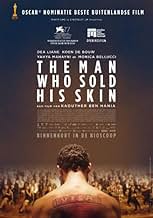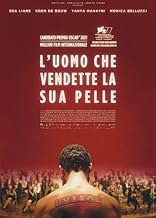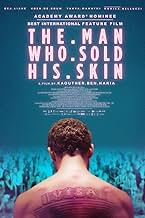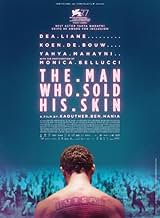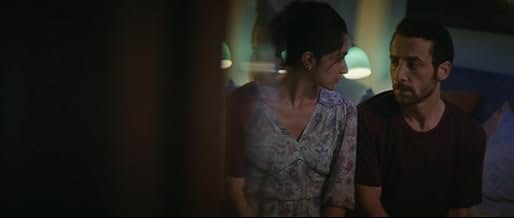IMDb-BEWERTUNG
6,9/10
7537
IHRE BEWERTUNG
Ein syrischer Flüchtling lässt seinen Rücken als Kunstwerk tätowieren, um zu seiner Liebe nach Europa zu reisen, doch seine Entscheidung bringt ihm alles andere als Freiheit.Ein syrischer Flüchtling lässt seinen Rücken als Kunstwerk tätowieren, um zu seiner Liebe nach Europa zu reisen, doch seine Entscheidung bringt ihm alles andere als Freiheit.Ein syrischer Flüchtling lässt seinen Rücken als Kunstwerk tätowieren, um zu seiner Liebe nach Europa zu reisen, doch seine Entscheidung bringt ihm alles andere als Freiheit.
- Für 1 Oscar nominiert
- 9 Gewinne & 12 Nominierungen insgesamt
Koen De Bouw
- Jeffrey Godefroi
- (as Koen de Bouw)
Empfohlene Bewertungen
"The Man Who Sold His Skin" depicts a refugee forced into an unpleasant predicament. In showing the plight of refugees, Kaouther Ben Hani's Academy Award-nominated movie also looks at the cold attitudes of supposedly highbrow individuals. The sad thing is that there are probably people in real life who have gotten subjected to this sort of thing. I recommend it.
"The Man Who Sold His Skin" is a visually stunning and thought-provoking film that delves into the themes of identity, personal sacrifice, and the commodification of human life. Through its exploration of the contemporary art world, it raises thought-provoking questions about the boundaries between art and exploitation. With exceptional performances, particularly from Yahya Mahayni as the protagonist, and exquisite cinematography that captures the juxtaposition of beauty and brutality, this film leaves a lasting impact on viewers. It is a captivating and memorable cinematic experience that skillfully combines social commentary, romance, and dark humor to create a unique and thought-provoking narrative. As the story unfolds, the film prompts reflection on the power dynamics at play in society and the sacrifices individuals make for personal freedom. "The Man Who Sold His Skin" is a true standout in its ability to engage, provoke, and resonate long after the credits roll.
"The Man Who Sold His Skin," Tunisia's first ever International Feature Film nominee at the Academy Awards, reminded me a lot of the movie "Synonyms" from last year. Both are about men who have been exiled from their countries of origin -- in one the man is a Syrian refugee, in the other a young man self exiles himself from the oppressive military culture of Israel. In both films, the men find themselves turned into commodities by their adopted countries, welcomed only as much as they can prove themselves to be useful. I liked both films quite a lot, "Synonyms" probably a bit more, but "The Man Who Sold His Skin" is quite good in its own right.
It's apparently based on a true story, though I always take that claim with a grain of salt. The man at the film's center agrees to have his entire back tattooed with a visa that allows refugees to travel freely through Europe, which turns him into a living work of art on display in museums and galleries. The lack of narrative subtlety is compensated for by a striking visual style. This film looks beautiful, nearly every scene offering the viewer composition just begging to be admired. Indeed, at times it's almost a little too beautiful, too carefully composed, as if the director just couldn't help but make choices that would draw attention to themselves. But it's a sin I can forgive when the results are a movie that looks as good as this one does.
Grade: A.
It's apparently based on a true story, though I always take that claim with a grain of salt. The man at the film's center agrees to have his entire back tattooed with a visa that allows refugees to travel freely through Europe, which turns him into a living work of art on display in museums and galleries. The lack of narrative subtlety is compensated for by a striking visual style. This film looks beautiful, nearly every scene offering the viewer composition just begging to be admired. Indeed, at times it's almost a little too beautiful, too carefully composed, as if the director just couldn't help but make choices that would draw attention to themselves. But it's a sin I can forgive when the results are a movie that looks as good as this one does.
Grade: A.
A desperate man on the run from Syria, sells his back as a canvas for an eccentric artist. He sits as a display for audiences at galleries and museums. His girlfriend Has moved to Belgium with her new husband. He is well paid but has doubts about his choice. The story uses a real life situation where a man sold his skin to an artist. The movie was nominated for an Oscar and I rank it just below A Better Life in the foreign film category.
I hadn't realised that was by a Tunisian director. She did a good job to get Syrians to play nearly all of the principal parts. It really irritates me when the accents don't match the supposed country when I watch an Arabic-language film and I always wonder why so many films make do with impersonations. I used to live in Syria, so it is even worse when the actors are playing (and failing) the various Syrian accents.
I was also pleased to see that there was very little propaganda against His Excellency Bashar al-Assad, the elected President of Syria. He was referred to as a dictator at one point; I wish the translation on the subtitles had said "Autarch" which might have been better. However, despite the freedoms experienced by Syrians before the attack on her, the results of the scene in the train during the marriage proposal and its subsequent sequels are wearily familiar as were the family connections used as a solution.
Life as a refugee was shown unflinchingly. I have had experience of some of the tricks and strategies used by migrants to stay alive - I live in a different Arab country now and see sub-Saharan immigrants at exhibitions where food will be served so they can get a meal for free just as Sam and his friends do in the film.
It's at one of these exhibitions that Sam's life changes. He makes a pact that will allow him to follow his love to Europe to fulfil a promise and a dream. He has contracted out his body.
Not everything goes smoothly, of course. There wouldn't have been a film if it had. That the hour and forty four minutes flew past is a testament to the power of the storyline and plot development. The last two twists in the final minutes of the film had me in the depths of despair; I'd seen the first one coming. What else would DAESH had done? There's another development after that which resolves the film completely.
I had had this waiting to be watched for a month or so. Last night was an ideal time to watch; I was relaxed and ready for it. I recommend the film.
I was also pleased to see that there was very little propaganda against His Excellency Bashar al-Assad, the elected President of Syria. He was referred to as a dictator at one point; I wish the translation on the subtitles had said "Autarch" which might have been better. However, despite the freedoms experienced by Syrians before the attack on her, the results of the scene in the train during the marriage proposal and its subsequent sequels are wearily familiar as were the family connections used as a solution.
Life as a refugee was shown unflinchingly. I have had experience of some of the tricks and strategies used by migrants to stay alive - I live in a different Arab country now and see sub-Saharan immigrants at exhibitions where food will be served so they can get a meal for free just as Sam and his friends do in the film.
It's at one of these exhibitions that Sam's life changes. He makes a pact that will allow him to follow his love to Europe to fulfil a promise and a dream. He has contracted out his body.
Not everything goes smoothly, of course. There wouldn't have been a film if it had. That the hour and forty four minutes flew past is a testament to the power of the storyline and plot development. The last two twists in the final minutes of the film had me in the depths of despair; I'd seen the first one coming. What else would DAESH had done? There's another development after that which resolves the film completely.
I had had this waiting to be watched for a month or so. Last night was an ideal time to watch; I was relaxed and ready for it. I recommend the film.
Wusstest du schon
- WissenswertesWhile director Kaouther Ben Hania was visiting the Louvre Museum in Paris in 2012, there was a retrospective of Belgian artist Wim Delvoye. There she saw, in Napoleon III's apartments, Delvoye's Tim (2006 - 08), in which the artist had tattooed the back of Tim Steiner, who was sitting on an armchair with his shirt off displaying Delvoye's design. The piece was sold to a German art collector and Tim is contractually obliged to spend a certain amount of time, topless and sitting still, in a gallery every year. Wim Delvoye appears in the movie as the insurance guy.
- PatzerWhen Sam Ali changes his seat at the train at 05:55, the place of the man in the back seat changes each time the camera switches between Sam and Abeer.
- VerbindungenFeatured in Die 93. Oscar-Verleihung (2021)
- SoundtracksFiliae maestae Jerusalem, RV 638: I, 'Filiae maestae Jerusalem'
Music by Antonio Vivaldi (uncredited)
Conducted and Performed by Philippe Jaroussky (Audio) (p)
Performed by Ensemble Artaserse (uncredited)
2014 Erato/Warner Classics, Warner Music UK Ltd.
Top-Auswahl
Melde dich zum Bewerten an und greife auf die Watchlist für personalisierte Empfehlungen zu.
- How long is The Man Who Sold His Skin?Powered by Alexa
Details
- Erscheinungsdatum
- Herkunftsländer
- Offizielle Standorte
- Sprachen
- Auch bekannt als
- The Man Who Sold His Skin
- Drehorte
- Produktionsfirmen
- Weitere beteiligte Unternehmen bei IMDbPro anzeigen
Box Office
- Budget
- 2.230.000 € (geschätzt)
- Weltweiter Bruttoertrag
- 227.290 $
- Laufzeit
- 1 Std. 44 Min.(104 min)
- Farbe
- Sound-Mix
- Seitenverhältnis
- 2.39 : 1
Zu dieser Seite beitragen
Bearbeitung vorschlagen oder fehlenden Inhalt hinzufügen


